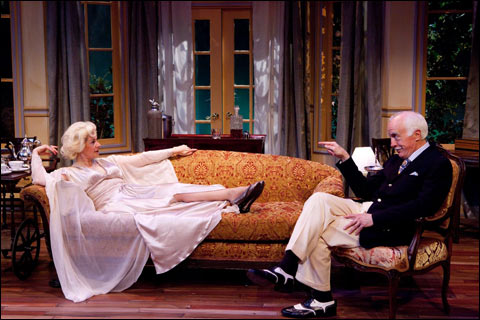
BLITHE SPIRIT: Paula Plum and Richard Snee play off each other with customary aplomb. |
It doesn’t take a crystal ball to predict that Blithe Spirit, that cocktail shaker full of dry martini and ectoplasmic mayhem, will amuse. Playwright Noël Coward diagnosed his own gift as a talent to do just that. And the local-star-studded revival by the Lyric Stage Company of Boston (through June 6) is both dry and chaotic enough to please. It might seem more magical were it not haunted by the blithe spirit of a 2008 Trinity Repertory Company staging that was more nuanced in tone and lighter on its feet. Ah, well, this one boasts the debonair-even-when-consternated Richard Snee, who was very possibly born wearing a dinner jacket, as the skeptical novelist hosting a séance for reasons of research, and Paula Plum, deliciously snarky while wafting as the ghost who came to dinner and won’t go away.
Coward’s droll 1941 spoof on the occult is a perfect example of the writer’s mastery of the light: here he’s able to keep the wit ball rolling through some serious marital strife and a murder. Then there’s the sticky sociological wicket of “astral bigamy,” which occurs when upper-crust scribbler Charles Condomine and his second wife, Ruth, invite another couple and the wacky village medium over for a séance that inadvertently conjures the ghost of the writer’s first wife, Elvira. Even before her demise, Elvira was less down-to-earth than Ruth, and now she’s dead-set on mischief. Coward, for his part, is dead-set on milking merriment from repeated manifestations of the misunderstanding that occurs when harsh badinage aimed at Elvira by Charles, who can see and hear her, is interpreted as insult by Ruth, who cannot. It’s impressive how many times the playwright makes this work.
Blithe Spirit is a chestnut, of course, and one that’s masticated often — a 2009 Broadway revival won Angela Lansbury, as eccentric psychic Madame Arcati, a Tony Award. Here we are served impish Kathy St. George as an unusual Arcati: less bangle-laden, trance-hopping Miss Marple than harem-clad leprechaun on uppers. Intense with conviction and giddy with delight at the otherworldly mess she’s made, she’s adorable, if not exactly what Coward had in mind. Plum, diaphanously draped and platinum-coiffed, and Snee, crisp even when flappable, play off each other with customary aplomb. And Anne Gottlieb, sangfroid intact but nostrils flared, gives good umbrage as Ruth. Cowardly ditties, as well as Irving Berlin’s “Always,” a key to the plot, bridge the scenes in pre-recorded, period-suggestive warblings by Leigh Barrett. Brynna Bloomfield’s parlor-and-garden set demonstrates, as it should, a life of its own. And director Spiro Veloudos keeps the supernatural shenanigans moving toward their home-wrecking conclusion.
The Mikado was a kind of hot potato on its way to becoming Hot Mikado. W.S. Gilbert & Arthur Sullivan’s sublimely silly and satiric 1885 operetta had morphed into The Swing Mikado, The Hot Mikado, The Cool Mikado, The Black Mikado, even Metropolitan Mikado before adapters David H. Bell and Rob Bowman came up with their 1940s-set jazz-and-swing version, which made its debut at Washington’s Ford’s Theatre, scene of the Lincoln assassination, in 1986. Not to worry: The Mikado isn’t slain by the addition of screaming horns and the Lindy hop in this multicultural updating, which aims to add some Benny Goodman to the Cab Calloway and Bill Robinson of the several African-American invasions of Titipu that preceded it. The show remains, in fact, quite resilient in a New Repertory Theatre production (at the Arsenal Center for the Arts though May 22) that leaps off the stage at you.